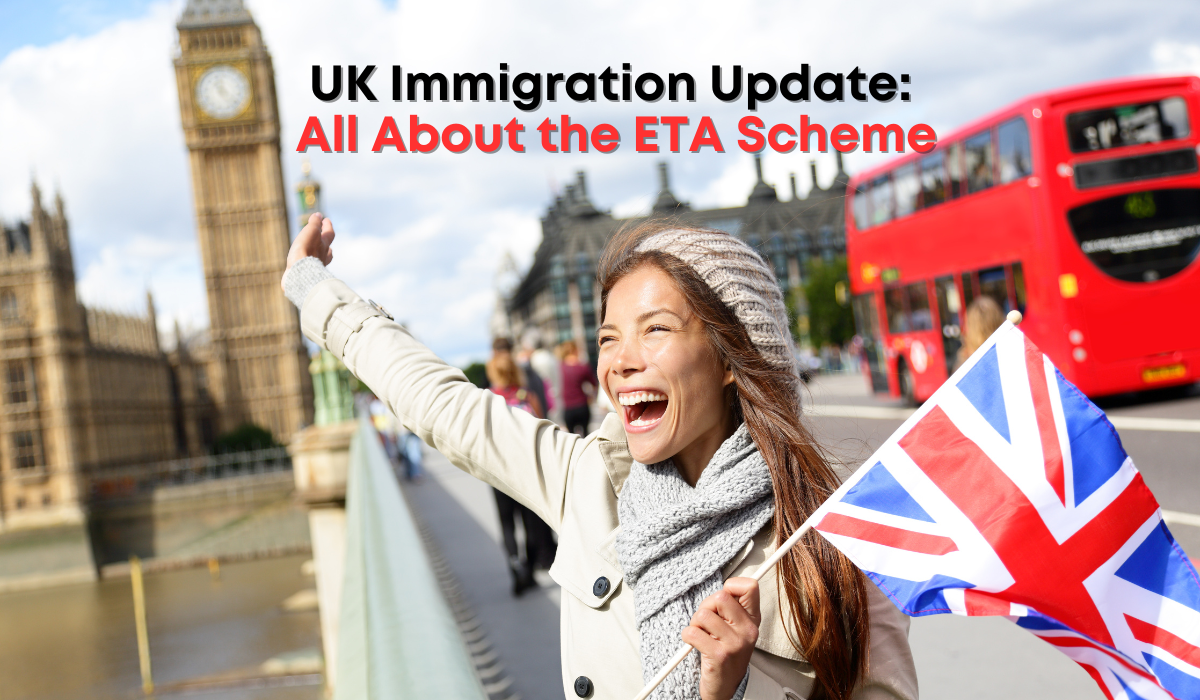The UK government has introduced the Electronic Travel Authorisation (ETA) scheme as part of its ongoing efforts to enhance border security and streamline immigration processes. Announced in the March 2023 Statement of Changes to the Immigration Rules (HC 1160), the scheme is being phased in and will eventually apply to all non-visa nationals. Here’s what you need to know about the scheme, its application process, and its broader implications for travelers.
What Is the Electronic Travel Authorisation Scheme?
The ETA scheme requires certain travelers to obtain prior authorisation before entering the UK. This includes visitors and transit passengers who do not need a visa for short stays or who do not hold existing immigration status.
The ETA is comparable to the United States’ Electronic System for Travel Authorisation (ESTA), offering a straightforward application process that facilitates pre-arrival security checks. Without a valid ETA, airlines will deny boarding, and travelers may be refused entry at the UK border.
The scheme applies to those intending to:
- Stay in the UK for up to six months as tourists, business visitors, or short-term students.
- Stay for up to three months under the Creative Worker visa concession.
- Engage in Permitted Paid Engagements.
- Transit through the UK, even without passing through border control.
Once issued, an ETA remains valid for two years or until the associated passport expires. It allows multiple entries during its validity period.
Who Needs an ETA?
The ETA scheme targets non-visa nationals and is being rolled out in phases. The first phase began in October 2023 for Qatari nationals. By February 2024, it included nationals of Bahrain, Kuwait, Oman, Saudi Arabia, and the UAE.
Jordanian nationals were initially included but were later moved to the visa-required category under Appendix Visitor: Visa National List.
Starting 8 January 2025, the scheme will apply to nationals from 48 countries listed in Appendix ETA National List, with further expansion to include European nationals from 5 March 2025 for travel on or after 2 April 2025. Importantly, every traveler—including babies and children—must have a valid ETA.
Who Is Exempt from the ETA Requirement?
Several groups are exempt from the ETA requirement, including:
- British citizens.
- Irish citizens, unless subject to a deportation order or international travel ban.
- British Overseas Territory Citizens traveling on relevant passports.
- Individuals with valid UK immigration status, such as a visit visa or residency.
- Residents of the Common Travel Area (Guernsey, Jersey, the Isle of Man, and Ireland).
The exemption for residents of Ireland safeguards the Common Travel Area agreement, protecting the rights of non-visa nationals in border communities and ensuring ease of travel.
How to Apply for an ETA
Applications can be made online or via the UK ETA mobile app. The process is straightforward, with an application fee of £10 per person. Applicants will need to provide personal details, travel information, and any required documentation.
Decisions are typically made within three working days, and successful applicants will receive confirmation via email. The ETA is electronically linked to the traveler’s passport, which must be the same passport used for both the application and travel.
What If an ETA Application Is Refused?
A refusal does not prevent future travel to the UK, but the applicant must apply for a visa, such as a visitor visa or a Temporary Work – Creative Worker visa, if applicable. This underscores the importance of submitting accurate and complete information to avoid delays.
Why Was the ETA Scheme Introduced?
The Home Office describes the ETA as a crucial measure to bolster border security. In a February 2024 factsheet, the government emphasized its aim to “strengthen the security of our border” by ensuring that all travelers have appropriate authorisation before entering the UK.
The ETA aligns the UK with similar systems worldwide, such as the EU Entry/Exit System (EES) and the European Travel Information and Authorisation System (ETIAS), both set to launch in 2025. This reflects a broader global trend toward pre-travel authorisation systems.
Implications of the ETA Scheme
The introduction of the ETA represents a significant change in UK immigration processes. While its primary objective is security, it also has practical implications for frequent travelers and border communities. As the rollout continues, both travelers and airlines must adapt to the new requirements.
To avoid complications, travelers should ensure they apply for an ETA well in advance of their planned travel dates.
The ETA scheme underscores the UK’s shift toward a fully digital border system, highlighting the government’s commitment to both security and efficiency. As its implementation progresses, it will play a pivotal role in shaping the future of UK immigration policy.
Get in touch: For a comprehensive understanding of your options or queries on UK immigration matters, contact GigaLegal Solicitors at 02074067654 or click here to book a no-obligation consultation with an immigration expert.


